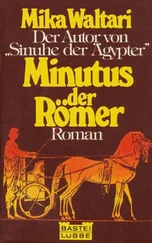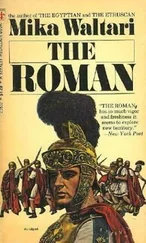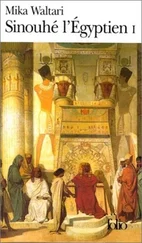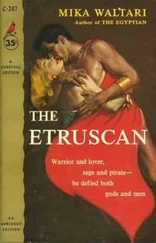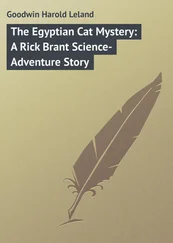Mika Waltari - The Egyptian
Здесь есть возможность читать онлайн «Mika Waltari - The Egyptian» весь текст электронной книги совершенно бесплатно (целиком полную версию без сокращений). В некоторых случаях можно слушать аудио, скачать через торрент в формате fb2 и присутствует краткое содержание. Жанр: Исторические приключения, на английском языке. Описание произведения, (предисловие) а так же отзывы посетителей доступны на портале библиотеки ЛибКат.
- Название:The Egyptian
- Автор:
- Жанр:
- Год:неизвестен
- ISBN:нет данных
- Рейтинг книги:3 / 5. Голосов: 1
-
Избранное:Добавить в избранное
- Отзывы:
-
Ваша оценка:
- 60
- 1
- 2
- 3
- 4
- 5
The Egyptian: краткое содержание, описание и аннотация
Предлагаем к чтению аннотацию, описание, краткое содержание или предисловие (зависит от того, что написал сам автор книги «The Egyptian»). Если вы не нашли необходимую информацию о книге — напишите в комментариях, мы постараемся отыскать её.
The Egyptian — читать онлайн бесплатно полную книгу (весь текст) целиком
Ниже представлен текст книги, разбитый по страницам. Система сохранения места последней прочитанной страницы, позволяет с удобством читать онлайн бесплатно книгу «The Egyptian», без необходимости каждый раз заново искать на чём Вы остановились. Поставьте закладку, и сможете в любой момент перейти на страницу, на которой закончили чтение.
Интервал:
Закладка:
Ptahor sniffed at it and tasted it suspiciously, then emptied the cup with evident enjoyment and gave a contented sigh.
He was a bowlegged, shaven-headed little man with a breast and belly that sagged beneath the thin robe. His collar, set with precious stones, was now soiled like the rest of his dress, and he smelled of oil, wine, and sweat.
Kipa served him with spice cakes, small fish fried in oil, fruit, and roast goose. He ate politely though it was clear that he had just come from a good meal, and he tasted and praised every dish to Kipa’s great delight. At his desire I took beer and food to the Negroes, but they returned the courtesy by shouting insults and asking whether old swagbelly was ready to go. The servant snored beneath the sycamore, and I had no wish to wake him.
The evening grew extremely confused, as my father, too, drank more than I had ever seen him do, so that at last Kipa, sitting in the kitchen, was overcome with woe and sat rocking back and forth with her head in her hands. When the pitcher was empty, they drank father’s medicinal wine. When that was gone, they started upon ordinary table beer; for Ptahor assured us that he was not particular.
They talked of their student days in the House of Life, swaying and embracing each other as they sat. Ptahor related his experiences as royal skull surgeon, affirming that it was the last branch in which any physician should specialize, being more suited to the House of Death than the House of Life. But there was little work attached to it, and he had always been lazy, as Senmut the Tranquil would certainly remember. The human head-except for the teeth, ears, and throat, which required their own specialists-was in his view the simplest thing to study, and so he had chosen it.
“But,” said he, “if I had had any decency I should have remained what I was: an honest physician bringing life to his patients. As it is,, my lot is to deal out death when kinsfolk grow weary of the old or the incurable. I should be like you, friend Senmut-poorer perhaps, but leading a more honest, a more wholesome life.”
“Never believe him, boys!” said my father-for Thothmes was sitting with us now and held a small wine cup in his hand. “I am proud to call Pharaoh’s skull borer my friend; in his own line he is the most highly skilled in all Egypt. Do I not remember the prodigious trepanning operations by which he saved the lives of mighty and humble alike and astonished the world? He releases evil spirits that drive men to madness and takes their round eggs from men’s brains.
Grateful patients bestow gold and silver upon him, chains and drinking cups.”
“But grateful kinsfolk have done more,” put in Ptahor thickly. “For if by chance I heal one in ten, one in fifteen-no, let us say one in a hundred-so much more certain is the death of the others. Have you heard of a single Pharaoh who lived three days after his skull had been opened? No, the mad and incurable are put under my flint knife and the richer and more illustrious, the quicker they come. My hand releases men from pain, divides inheritances-land, cattle, and gold-my hand raises Pharaohs to the throne. Therefore they fear me, and none dares speak against me, for I know too much. But what increases knowledge increases sorrow, and I am a most unhappy man!”
Ptahor wept a little and blew his nose on Kipa’s shroud.
“You are poor but honest, Senmut,” he sobbed. “Therefore, I love you, for I am rich and rotten-rotten-a lump of ox dung upon the road.”
He took off his jeweled collar and hung it about my father’s neck, and then they began to sing songs whose words I could not understand though Thothmes listened with interest and told me that riper songs were not to be heard even in barracks. Kipa began to weep loudly in the kitchen. One of the Negroes came over from the acacia bushes, lifted Ptahor in his arms and would have carried him to his chair, for it was long after bedtime. But Ptahor struggled and uttered pitiful cries, called upon the watchmen to help him and vowed that the Negro meant murder. As my father Vas of no help, Thothmes and I drove the Negro off with sticks until he flew into a rage and went, swearing violently and taking comrade and chair with him.
Ptahor now emptied the beer jug over himself, asked for oil to rub on his face, and tried to bathe in the pool. Thothmes whispered to me that we ought to get the old men into bed, and so it came about that my father and the royal skull surgeon fell asleep on Kipa’s bed with arms about each other’s necks, slobbering oaths of eternal friendship to the last.
Kipa wept and tore her hair and sprinkled herself with ash from the roasting pit. I was tormented by the thought of what the neighbors would say, for the roaring and racket had sounded far and wide into the still night. Thothmes was placid, however, for he had seen wilder doings in barracks and in his father’s house when the charioteers talked of the old days and of the punitive expeditions into Syria and the land of Kush. He contrived to quiet Kipa, and after we had cleared away the traces of the feast as best we could, we, too, went to bed. The servant snored on beneath the sycamore, and Thothmes lay down beside me in my bed, put his arm about my neck, and talked about girls for he also had drunk wine. But I found this wearisome, being a year or two younger than he, and soon fell asleep.
Early in the morning I was awakened by bumping and sounds of movement in the bedroom, and on entering I saw my father still sound asleep in his clothes with Ptahor’s collar about his neck. Ptahor was sitting on the floor holding his head in his hands and asking in a woeful voice where he was.
I greeted him respectfully and told him that he was still in the harbor quarter, at the house of Senmut the physician. This quieted him, and he asked for beer in the name of Ammon. I pointed out to him that he had emptied the beer jug over himself, as his robe testified. He then rose, drew himself up with a dignified frown, and went out. I poured water over his hands, and he bowed his bald head with a groan, bidding me pour water over that, too. Thothmes, who had also awakened, brought him a can of sour milk and a salt fish. When he had eaten, he grew more cheerful. He went out to the sycamore where the servant lay sleeping and began to beat him with his stick till the fellow woke and stood up, his garment stained from the grass and his face earthy.
“Miserable swine!” cried Ptahor and smote him again. “Is it thus you mind your lord’s affairs and bear the torch before him? Where is my chair? Where is my clean robe? And my medicinal berries? Out of my sight, contemptible thief and swine!”
“I am a thief and my lord’s swine,” said the servant meekly. “What are my lord’s commands?”
Ptahor gave him his orders, and he went off to look for the chair. Ptahor settled himself comfortably under the sycamore, leaned against the trunk, and recited a poem concerning morning, lotus flowers, and a queen bathing in the river, and then related to us many things that boys love to hear. Kipa meanwhile awoke, lit the fire, and went in to my father. We could hear her voice right out in the garden, and when my father emerged later in a clean robe, he looked sorrowful indeed.
“You have a handsome son,” said Ptahor. “He carries himself like a prince, and his eyes are gentle as a gazelle’s.” Young as I was, I understood that he spoke thus to make us forget his behavior of the night before. After a while he went on, “Has your son talent? Are the eyes of his soul as open as those of his body?”
Then Thothmes and I fetched our writing tablets. The royal skull surgeon, gazing abstractedly into the topmost branches of the syca more, dictated a little poem, which I still remember. It ran thus:
Rejoice, young man, in thy youth,
Читать дальшеИнтервал:
Закладка:
Похожие книги на «The Egyptian»
Представляем Вашему вниманию похожие книги на «The Egyptian» списком для выбора. Мы отобрали схожую по названию и смыслу литературу в надежде предоставить читателям больше вариантов отыскать новые, интересные, ещё непрочитанные произведения.
Обсуждение, отзывы о книге «The Egyptian» и просто собственные мнения читателей. Оставьте ваши комментарии, напишите, что Вы думаете о произведении, его смысле или главных героях. Укажите что конкретно понравилось, а что нет, и почему Вы так считаете.

